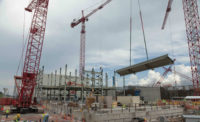GE Hitachi Nuclear Energy and Bechtel National Inc. have been selected to develop the conceptual design and cost, schedule and safety estimates for a fast-spectrum test reactor that would be used to develop fuels, structural materials, instruments and sensors for advanced nuclear reactors.
The U.S. Dept. of Energy started the Versatile Test Reactor program this year in part due to responses from U.S. companies developing advanced reactors, many of which need different testing facilities than the commercial nuclear power technology in use today. “Advanced reactors hold great promise, but their fuels and materials need proper testing before they can be licensed and used in energy producing reactors,” says Peggy McCullough, senior vice president of Bechtel’s nuclear, security and operations unit. The firm is a GE Hitachi subcontractor.
The Nuclear Energy Innovation Capabilities Act also highlighted the need for the fast reactor and authorized DOE to proceed. “The next generation of nuclear reactors are fast reactors, not thermal reactors,” says John Bumgardner, test reactor program manager at DOE’s Idaho National Laboratory
Many advanced generation reactors will require fast nuclear fuels, meaning their fission chain reaction is sustained by neutrons that move at 8,700 miles per second, compared with slow-moving thermal neutrons used in today’s reactors that move at about 5,000 miles per hour, Bumgardner told ENR. New advanced generation reactors often use fast neutrons to get a more compact reactor. “We need a place to test the new fuels and to understand how materials will behave,” he says.
Under the contract, GE Hitachi’s PRISM prototype sodium-cooled nuclear reactor design will be adapted to meet the R&D needs of a fast-test reactor, Bumgardner said. The firm is a joint venture of General Electric Co. and Hitachi Ltd. Adapting an existing technology will help meet DOE’s aggressive schedule to build a reactor in the U.S. by 2026. Design and cost-schedule estimates are key to DOE’s decision in 2020 to move forward with the program, said Kemal Pasamehmetoglu, test-reactor program executive director.
DOE last month funded 11 domestic advanced nuclear reactor technology projects, the third round of funding this year, for a total of about $98 million. The projects are partnerships of federal agencies, public and private labs and universities to advance U.S. commercial nuclear capability.





Post a comment to this article
Report Abusive Comment